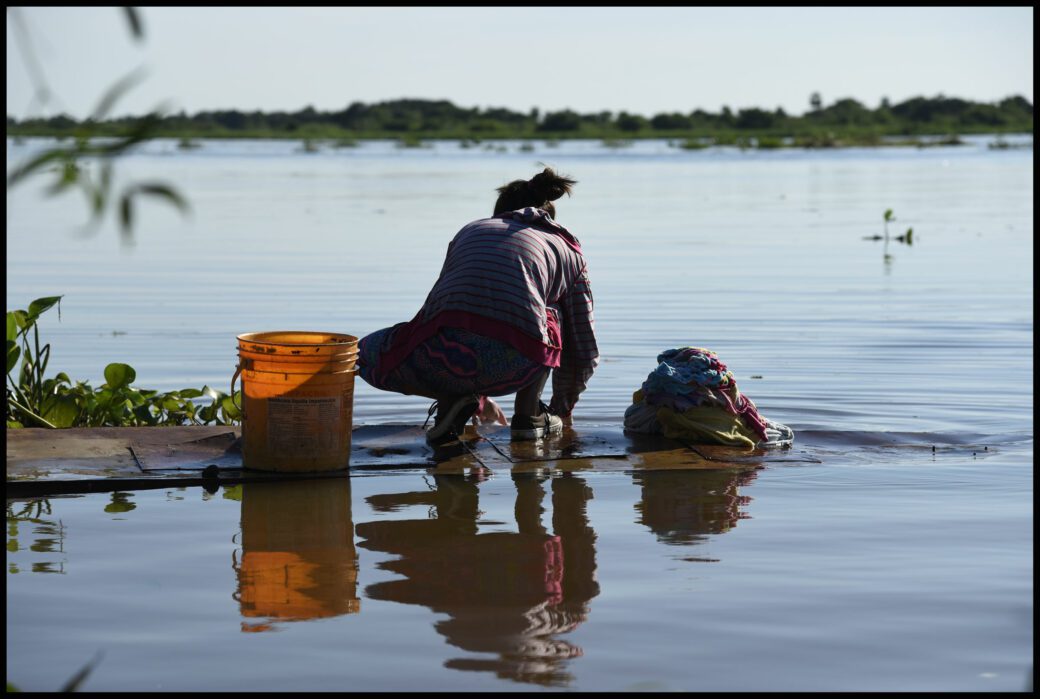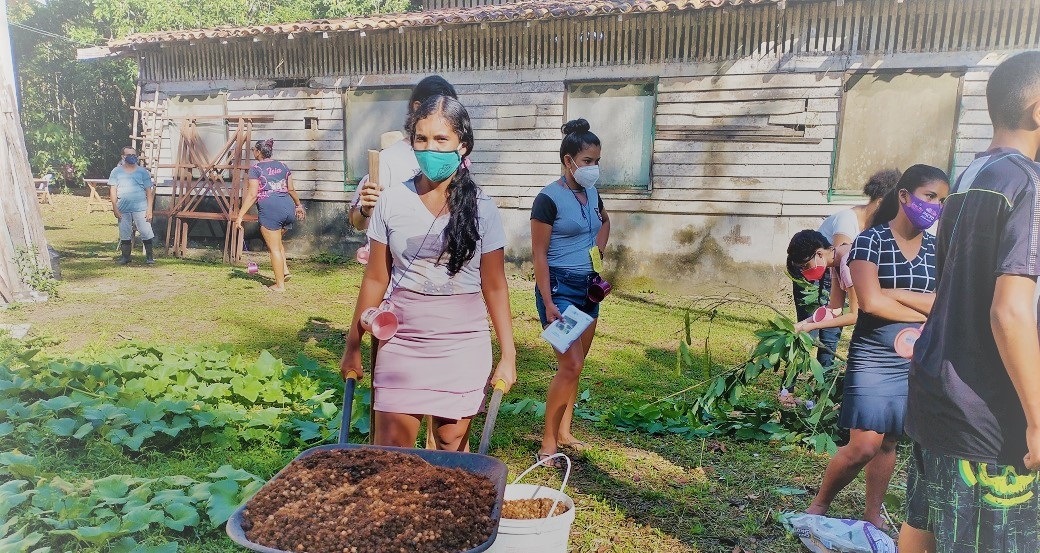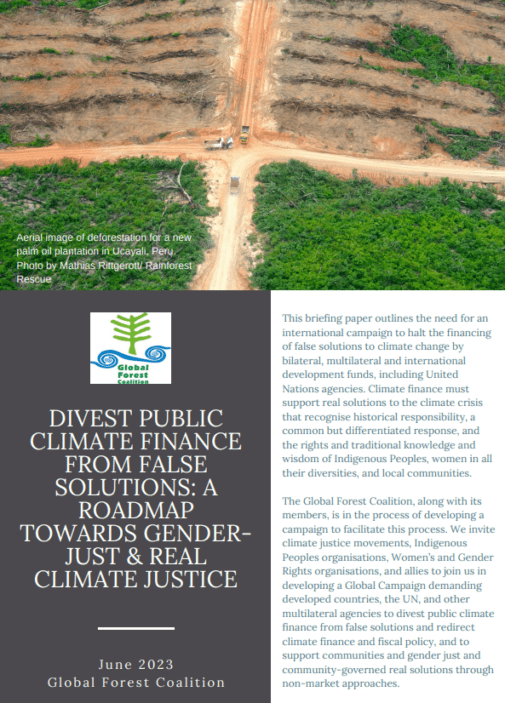Cambio transformador con justicia ambiental y de género exige soluciones reales sobre el clima, no “soluciones basadas en la naturaleza”

Crédito de la foto: Fernando Franceschelli
La Coalición Mundial por los Bosques (GFC) realiza aportes periódicos a los procesos de las Naciones Unidas sobre temas como bosques, biodiversidad, cambio climático y género, como forma de llevar las perspectivas y prioridades de nuestros grupos miembros a los espacios internacionales de formulación de políticas. Este mes, el Programa de la ONU para el Medio Ambiente realizó una consulta global sobre las soluciones basadas en la naturaleza, noción que ha sido utilizada de forma cuestionable para promover enfoques de mercado ante las crisis climática y de la biodiversidad, como compensación de emisiones de carbono. Estos enfoques emplean la misma lógica capitalista que inicialmente causó la crisis. A continuación puedes leer nuestra propuesta para ese proceso de consulta.
Presentación para la Primera Consulta Intergubernamental del Programa de las Naciones Unidas para el Medio Ambiente sobre soluciones basadas en la naturaleza (SbN)
Coalición Mundial por los Bosques (GFC)
Mayo de 2023
La Coalición Mundial por los Bosques (GFC), una ONG formada por más de 120 organizaciones miembros de pueblos indígenas y comunidades locales de varios países del mundo, agradece al Programa de las Naciones Unidas para el Medio Ambiente (PNUMA) y a las co-presidentas la oportunidad de presentar propuestas durante la Primera Consulta Intergubernamental sobre Soluciones Basadas en la Naturaleza (SbN).
La GFC se une a las voces de países y partes interesadas que expresan su preocupación por los impactos de las soluciones basadas en la naturaleza (SbN) a los pueblos indígenas, las comunidades locales, las mujeres en toda su diversidad, los jóvenes y comunidades afrodescendientes. La Resolución 5/5 reconoce “la necesidad de analizar los efectos de las soluciones basadas en la naturaleza…, reconociendo que no sustituyen la necesidad de reducciones rápidas, profundas y sostenidas de las emisiones de gases de efecto invernadero”. A pesar de esta resolución, las soluciones basadas en la naturaleza siguen siendo un concepto utilizado para calificar falsamente de respetuosas con el medio ambiente o “verdes” a prácticas muy cuestionables e incluso descaradamente perjudiciales.
Apoyamos la aplicación de enfoques basados en los ecosistemas, como forma de abordar las causas profundas de la crisis climática, en lugar de reproducir un régimen climático colonialista que promueve el lavado verde de los programas de compensación de emisiones de carbono. El enfoque ecosistémico, que tiene sus raíces en el Convenio sobre la Diversidad Biológica (CDB) y en las decisiones de su COP, es el principal marco de actuación del Convenio, tal y como lo describe la Conferencia de las Partes. El Grupo Intergubernamental de Expertos sobre el Cambio Climático (IPCC) también reconoce en su Informe de Síntesis AR6 que los enfoques de adaptación basados en los ecosistemas han sido eficaces en la mitigación del cambio climático.
De acuerdo con una de las tareas de esta consulta, solicitamos que se lleven a cabo análisis con base científica de los efectos de las SbN, incluidos los impactos diferenciados sobre las mujeres en toda su diversidad, los pueblos indígenas y los grupos no privilegiados, antes de seguir apoyando estos mecanismos. Una recopilación de malas prácticas de soluciones basadas en la naturaleza también contribuiría a realizar una evaluación imparcial, enriquecería el debate y abordaría los retos a los que se enfrentan los grupos más vulnerables, especialmente en el Sur Global. Los enfoques basados en el mercado favorecen intrínsecamente a quienes tienen poder económico y tienden a afianzar aún más las desigualdades a las que se enfrentan las mujeres, los pueblos indígenas y otros grupos vulnerables que están subrepresentados económica, social y políticamente. Evitar cualquier marco político que permita la continuación de soluciones basadas en la naturaleza bajo el disfraz de procesos orientados al mercado es fundamental para apoyar los enfoques basados en los derechos y en la justicia de género en la conservación de la biodiversidad y la mitigación del cambio climático.
La GFC también se opone a cualquier apoyo a nuevas fuentes de financiación del sector privado, especialmente en el Sur Global, así como a la financiarización de la naturaleza a través de cualquier proyecto que busque oportunidades de inversión derivadas de la conservación, restauración y uso sostenible de la naturaleza.
Las políticas relacionadas con el clima y los bosques que nacen de las actuales mentalidades antropocéntricas, coloniales y patriarcales no hacen sino perpetuar las causas profundas de la crisis que supuestamente deben solventar. De esta forma, no abordan la distribución desigual del control y acceso a los recursos que viven las comunidades que están en la línea de batalla a partir del género, clase, raza, casta, edad y capacidad, entre otros factores.
Como resultado, mantienen un sistema injusto y desigual con formas de opresión que se entrecruzan, lo cual reproduce y refuerza las barreras estructurales en lugar de derribarlas. Las mujeres, especialmente las indígenas y rurales, son más vulnerables al cambio climático y a los cambios en el uso de la tierra, como la deforestación, por lo que abordar la desigualdad de género es fundamental para una mitigación y adaptación climáticas eficaces.
La elaboración de políticas climáticas sin perspectiva de género, que promueven falsas soluciones en lugar de enfoques ecosistémicos, es una de las principales preocupaciones de muchas organizaciones de la sociedad civil, como demuestra un reciente estudio de caso publicado por la GFC. Buscar un cambio transformador a través de la justicia de género y medioambiental exige soluciones reales al régimen climático, no esquemas vinculados a las mismas corporaciones, industrias y gobiernos responsables de gran parte del daño histórico y actual al planeta y a las comunidades de todo el mundo.
Las reducciones reales de emisiones son mucho más cruciales que las soluciones basadas en la naturaleza que no proponen acciones transformadoras sobre enfoques basados en la justicia de género y los derechos humanos. La GFC espera seguir apoyando al PNUMA en la promoción de una agenda común que abogue por la justicia ambiental y de género, respetando al mismo tiempo los principios del multilateralismo y los enfoques plurales.







